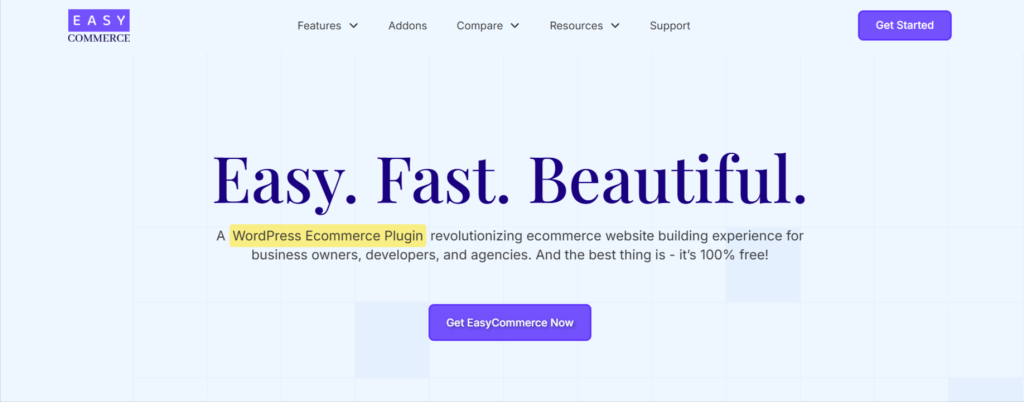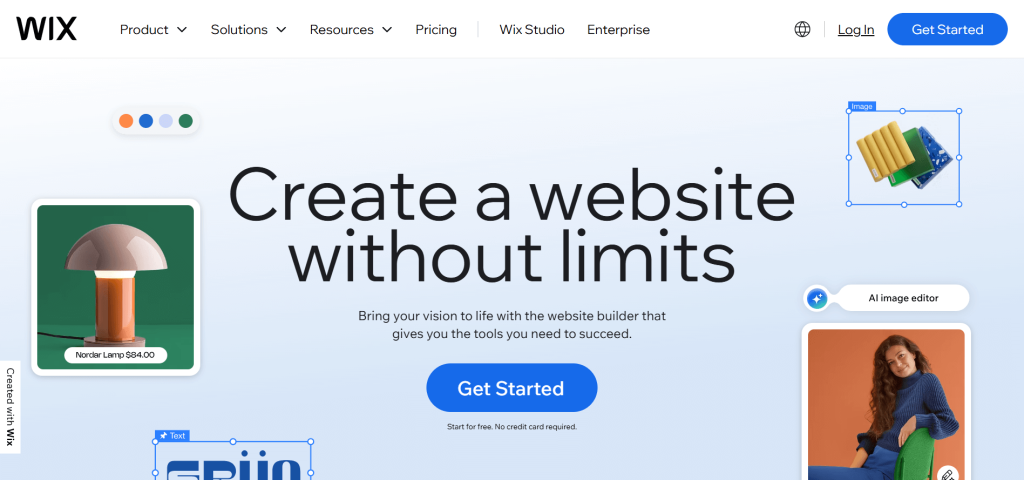So, you’ve got a folder full of cool t-shirt designs and a dream to turn them into something bigger. Maybe you’ve already gathered a small but loyal fanbase, but there’s one hurdle that hits every aspiring entrepreneur: Where do I actually sell these?
Finding the right platform can feel like picking a needle out of a haystack. Do you need built-in tools for inventory or print-on-demand services? What about customization to make your store feel connected to your brand? The options are endless, and what works for a gadget store might not click for a t-shirt business.
We’re breaking down the best ecommerce platforms for t-shirt sellers and exploring the pros, cons, and quirks of each option to give you a clearer picture of where your designs (and your brand) belong.
Let’s get into it.
5 Best Ecommerce Platforms for T-Shirt Sellers
When it comes to selling t-shirts online, not all platforms are made equal. You need a platform that’s easy to use, flexible enough to highlight your designs, and equipped with the right tools to handle everything from inventory to payments.
We’ve narrowed it down to five best ecommerce platforms for t-shirt businesses. Let’s kick things off with EasyCommerce.
1. EasyCommerce

If you’re looking for a platform that lives up to its name, EasyCommerce is a strong contender. It’s an ecommerce platform for WordPress, complete with dedicated templates, payment gateway integrations, easy inventory management, and many more essential tools.
This platform is perfect for entrepreneurs who don’t have the technical experience to launch an online store from the ground up. All you need to get started with EasyCommerce is a WordPress site, a domain name, and a hosting server.
You can just focus on your merchandise while the EasyCommerce system handles the technical legwork.
What Makes It Great for Selling T-Shirts?
EasyCommerce is great if you want a straightforward and budget-friendly platform to showcase your designs. It sets the tone for what an ecommerce platform for t-shirts should be: simple, functional, and catered to creative entrepreneurs.
This platform is highly scalable, so no matter how large your catalog gets, your store will never slow down or crash. EasyCommerce also uses an API-first approach to allow integrations with CRM systems, mobile apps, and websites.
From the EasyCommerce dashboard, you can also track which product variations (or t-shirt designs) are low in stock, as well as, what’s trending. So, you can always keep your inventory updated and your sales coming in.
Things to Consider
While it’s great for startups and beginners, it might not have the advanced features for a larger brand. If you require highly specialized tools, you may find its capabilities a bit limited.
Price
EasyCommerce is exceptionally affordable. You can launch your website for under $100, most of which will be spent on domain, hosting, themes, and extensions.
The core plugin itself is completely free to install and use.
2. Etsy

If you’re selling unique, artistic, or niche t-shirt designs, Etsy might already be on your radar. While it’s not a traditional ecommerce platform for t-shirts like EasyCommerce or Shopify, it does have a massive marketplace of creative sellers who want to connect with buyers looking for handmade, vintage, and unique items.
This makes Etsy a great place to make your t-shirts stand out if you don’t have any sales strategies in place.
What Makes It Great for T-Shirts?
Etsy has millions of active buyers who are specifically searching for unique and independent designs. So, even if you’re just starting out, you don’t need to drive your own traffic.
And if you’re worried about your products getting lost in the sea of one-of-a-kind items, you can optimize your listings with the right keywords and tags. Etsy has a built-in search algorithm that can help shoppers find your designs with the right SEO practices.
Things to Consider
Since Etsy is an already crowded marketplace, standing out can be tough. You will need great designs, strong branding, and smart marketing to rise above the rest. You will also be playing by Etsy’s rules (policy changes, fee adjustments, account suspensions), so we recommend not relying on it as your only sales channel.
Also, building a distinct and standalone brand can be tough, as your shop will always be live on Etsy’s platform and not on a separate website.
Price
While Etsy can be affordable, it’s not entirely free. It costs $0.20 to list an item for the first 4 months, and transaction fees are about $6.5 per sale. However, your first 40 listings are absolutely free.
3. Shopify

When it comes to selling t-shirts online, Shopify is the go-to powerhouse for a reason. It’s a complete website builder that comes with an ecosystem to help you launch, manage, and scale your store with minimal technical headaches.
Unlike Etsy, Shopify lets you create an individual brand, so you are in charge of everything from marketing, branding, and pricing. And with smart marketing efforts you can make your t-shirt business stand out amongst the noise, as there aren’t any competitors within the platform.
So, if you want to build a one-of-a-kind website/brand that reflects your unique t-shirt designs, go for Shopify.
What Makes It Great for T-Shirts?
The biggest plus of Shopify for t-shirts is its app store. If you want print-on-demand integration, subscription options, or upselling tools, you can bet that Shopify has a dedicated addon for it.
Shopify has hundreds of themes (including plenty designed for apparel stores), which you can use to create a store that matches your brand’s vibe without ever needing to code. This platform is also built for scaling, so no matter how big your catalog is, you can easily handle complex inventory and traffic spikes.
Things to Consider
While Shopify’s basic plan is cheap, premium themes, apps, and transaction fees can add to your expenses as you grow. You can use Shopify’s huge list of integrations to add any advanced functionalities, but some essential tools (like discount rule builders or custom checkout tweaks) can come with a large learning curve.
Unlike EasyCommerce (and other open-source platforms), which is built to be easily customizable, Shopify’s framework doesn’t let you customize most backend details.
Price
- Basic Shopify: $19/month; Good for new stores.
- Shopify: $49/month; Adds professional reports and lower transaction fees.
- Advanced Shopify: $299/month; Best for high-volume sellers needing advanced analytics.
4. Wix

If you want to build a visually stunning online store without dealing with complex setups, Wix deserves a serious look. While it might not have the ecommerce-specific reputation of EasyCommerce or Shopify, it has recently become a strong option for creative entrepreneurs, especially t-shirt sellers who care as much about aesthetics as they do about sales.
We’re adding Wix to our list because it’s built for designers by designers. Its drag-and-drop editor is one of the most intuitive in the market, which means that you can edit almost every detail of your store to match your brand’s personality.
Wix also handles the basics of selling surprisingly well. The platform lets you manage product variants, connect print-on-demand services, and even sell subscriptions without plugins.
What Makes It Great for T-Shirts?
You can truly customize every element of your store to make a solid brand that reflects your designs. While you don’t necessarily need apps and addons for essential functions, you can however directly integrate with POD services like Printful to get print-on demand functionalities.
Wix also has an Artificial Design Intelligence (ADI) that automatically generates a store layout based on your products and aesthetics.
Things to Consider
Unlike open-source platforms like EasyCommerce, Wix requires you to add separate apps for features like abandoned cart recovery which can eventually bloat your site speed. One of the biggest downsides of Wix is that once you choose a template, you can’t switch back without completely rebuilding your entire site.
While this doesn’t seem like much, it can be difficult for scaling brands that need to redesign to evolve.
Price
- Light: $17/month; Free domain for 1 year with 2GB storage
- Core: $29/month; Basic marketing suite and entry-level ecommerce
- Business: $36/month; Priority support and 100GB storage
5. Squarespace

For t-shirt sellers who view their brand as a complete aesthetic experience and not just another product line, Squarespace offers something rare: the ability to create a beautiful store that feels more like an art gallery than a generic online shop.
While platforms like Shopify focus on raw ecommerce power and Etsy provides built-in audiences, Squarespace mixes minimalist design with just enough sales functionality for creative entrepreneurs. It’s all about building a unique brand where every product image appears crisp and intentional, every font pairing feels curated, and every page layout maintains a custom look.
So, if creativity is more important to you than sales, Squarespace is the best ecommerce platform for t-shirts for you.
What Makes It Great for T-Shirts?
Squarespace lets you create scrollable product stories that combine your designs with images, text blocks, and videos for a professional look. You also get over 1,000 font pairings for stunning typography to build brand stories.
Every template is automatically optimized for mobile browsing, which is essential as most impulse apparel purchases take place on smaller devices. And if you want to show off your creative work as well, Squarespace lets you include blog content, event calendars, and portfolios alongside your merchandise.
Things to Consider
With the main focus being aesthetics over sales, some visually striking templates can actually hurt conversion rates with excessive whitespace or unconventional navigation. There are also no native print-on-demand integrations or advanced tools like abandoned cart recovery.
Also, managing several product variations can become tedious, compared to dedicated ecommerce platforms for t-shirts.
Price
- Business: $23/month; Essential selling tools with 3% transaction fees
- Commerce Basic: $28/month; Selling tools for scalability with no transaction fees
- Commerce Advanced: $52/month; Advanced selling and discounting tools with subscriptions
Final Thoughts
Finding the best ecommerce platform for t-shirts is all about how you want to present your brand. You can go for EasyCommerce if you’re a beginner who wants to keep things simple and launch your store fast. Etsy gives you instant access to buyers who love indie designs, so you can list your products there if you don’t mind the competition.
Shopify balances power with ease-of-use for brands that are ready to grow. Wix lets you design a store as creative as your t-shirts, and lastly, Squarespace turns your shop into a visual experience that speaks your brand.
There’s no one-size-fits-all answer; it’s all about the platform that fits your next step. Maybe you’ll start on Etsy, move to Shopify as you grow, or use Wix to build a standout brand from day one.
Whatever you pick, the most important thing? Just start. Your designs deserve to be out in the world.
Frequently Asked Questions (FAQs)
Which platform is best for beginners selling t-shirts?
If you’re just starting out, EasyCommerce or Etsy are great choices. EasyCommerce has a simple setup that lets you build a store from scratch, while Etsy gives you instant access to buyers without needing to build a standalone store.
How much does it cost to sell t-shirts online?
The complete cost of selling t-shirts online can vary with the needs of your business.
- EasyCommerce is free to install and use (domain & hosting can incur costs)
- Etsy has no monthly fee (just listing & transaction fees).
- Wix start around $20–30/month.
- Shopify begins at $29/month (plus transaction fees).
- Squarespace starts at $36/month.
Can I switch platforms later if my t-shirt business grows?
Absolutely! Many sellers start on Etsy or EasyCommerce, then migrate to Shopify or Wix as they scale. Just note that moving from Squarespace or Wix can be trickier due to template lock-in.
Which platform is best for SEO and driving traffic?
- EasyCommerce is open-source and requires SEO plugins to drive traffic.
- Shopify and Wix have strong built-in SEO tools.
- Etsy benefits from marketplace traffic (but you don’t own the audience).
- Squarespace excels in visual content but requires more SEO effort.

